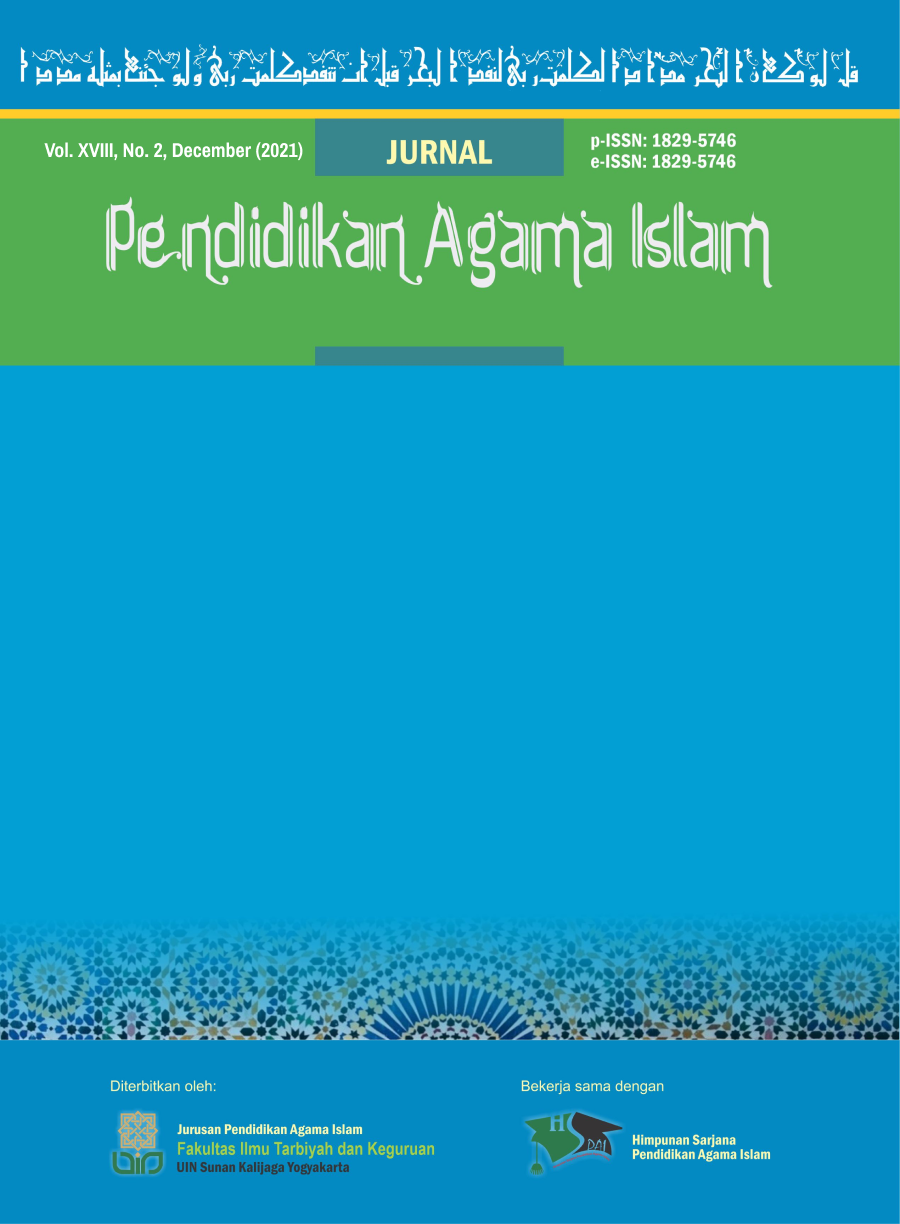Integration of Islamic and Indonesian Education in the Perspective of KH. Salahuddin Wahid
##plugins.themes.bootstrap3.article.main##
Abstract
Islam and Indonesia have been integrated since Islam entered into Nusantara (the Indonesian Archipelago) before Indonesia's independence. This combination has influenced the dynamics of the life of Muslims in Indonesia, including its influence on education issues. The researcher is interested in comprehending the extent of the integration, viewed from the perspective of KH. Salahuddin Wahid. This research focuses on two issues, (1) the thought of KH Salahuddin Wahid about Islamic and Indonesianness and (2) the integration of Islamic and Indonesian education, from the perspective of KH. Salahuddin Wahid. This study used a qualitative approach to literature study with descriptive-analytical data analysis. The research design used is to carry out a literature study by the discussion and to conduct the necessary interviews to complete the data with several informants. The next step is to reduce the data obtained, analyze it, and obtain conclusions according to the focus of the study. The results of this study indicate that in education, integration occurs in various approaches, including, (1) internalizing religious values taught in Islamic religious education, (2) strengthening character and moral education through Islamic religious education, (3) combining religious and non-religious education and discarding the dichotomy of the two, it means combining Islamic education with national education, (4) combining Islamic religious education with science and technology, (5) leveling Islamic boarding schools (pesantren) and improving their quality in order to compete with non-Islamic boarding schools, (6) promoting Islamic history education in Indonesia and its figures, through books, monuments such as museums, as well as educational films, (7) promoting Aswaja and NU education which is following the teachings of the scholars, especially KH. Hasyim Asy'ari, as a character who has successfully combined Islam and Indonesia.
Keywords:
Downloads
##plugins.themes.bootstrap3.article.details##
Copyright
Copyright Notice
Authors who publish with this journal agree to the following terms:
- Authors retain copyright and grant the journal right of first publication with the work simultaneously licensed under a Creative Commons Attribution License that allows others to share the work with an acknowledgement of the work's authorship and initial publication in this journal.
- Authors are able to enter into separate, additional contractual arrangements for the non-exclusive distribution of the journal's published version of the work (e.g., post it to an institutional repository or publish it in a book), with an acknowledgement of its initial publication in this journal.
- Authors are permitted and encouraged to post their work online (e.g., in institutional repositories or on their website) prior to and during the submission process, as it can lead to productive exchanges, as well as earlier and greater citation of published work.
References
Al-Qahthani, S. bin ‘Ali bin W. (t.t.). Encyclopedia Arab. Beirut: Dar Al-Ma’arif.
Arifin, I., & Slamet, M. (2010). Kepemimpinan Kyai dalam Perubahan Manajemen Pondok Pesantren: Kasus Pondok Pesantren Tebuireng. Yogyakarta: CV Aditya Media.
Aziz, A. A. (2021). Peneguhan Keislaman dan Keindonesiaan oleh Gus Sholah melalui Film [Komunikasi pribadi].
Djamas, N. (2009). Dinamika Pendidikan Islam di Indonesia Pascakemerdekaan. Jakarta: Rajawali Press.
Esposito, J. L. (2002). Ensiklopedi Oxford Dunia Islam Modern. Bandung: Mizan.
Faozan, A. (2021). Gus Sholah dan Perjuangan Memadukan Keislaman dan Keindonesiaan melalui Penerbitan Buku [Komunikasi pribadi].
Faozan, A., & dkk. (2018). KH. A. Wahid Hasyim dalam Pandangan Dua Puteranya. Jombang: Pustaka Tebuireng.
Faozan, A., & dkk. (2020). Gus Sholah, Kembali ke Pesantren, Kyai Tekhnokrat Menjawab Keraguan Masyarakat. Jombang: Pustaka Tebuireng.
Gunawan, E. (2017). Relasi Agama dan Negara. KURIOSITAS: Media Komunikasi Sosial Dan Keagamaan, 10(2), 1–21. https://doi.org/10.35905/kur.v10i2.589
Hadi, S. (1990). Metodologi Research. Yogyakarta: Andi Offset.
Idi, A., & Jalaluddin. (2018). Filsafat Pendidikan, Manusia, Filsafat dan Pendidikan. Depok: Rajagrafindo Persada.
Katsoff, L. O., dalam Irawati, Y. (2013). Metode Pendidikan Karakter Islami Terhadap Anak Menurut Abdullah Nasih Ulwan dalam Buku Pendidikan Anak Dalam Islam dan Relevansinya dengan Tujuan Pendidikan Nasional. UIN Sunan Kalijaga.
Khayati, S. Q. (2019). Keislaman Negeri Muslim (Kontestasi dan Konsep Negara Agama Perspektif Gus Sholah dan Gus Dur). Proceedings of Annual Conference for Muslim Scholars, 3(1), 905–914.
Kosim, M. (2014). Pendidikan Agama Islam di Sekolah Umum (Perspektif Sosio-Politik-Historis) | TADRIS: Jurnal Pendidikan Islam 01(01) 119-137. http://ejournal.iainmadura.ac.id/index.php/tadris/article/view/197
Lidwina, A. (2020). Persebaran Pondok Pesantren di 34 Provinsi | Databoks. https://databoks.katadata.co.id/datapublish/2020/10/01/persebaran-pondok-pesantren-di-34-provinsi
Mannan, A. (2014). Islam dan Negara. Islamuna: Jurnal Studi Islam, 1(2), Article 2. https://doi.org/10.19105/islamuna.v1i2.566
Mariam, F. (2017). Pesantren Tebuireng dan MPR RI Gelar Sosialisi Empat Pilar. Tebuireng Online. https://tebuireng.online/pesantren-tebuireng-dan-mpr-ri-gelar-sosialisi-empat-pilar/
Marzuki, M., Miftahuddin, M., & Murdiono, M. (2020). Multicultural Education In Salaf Pesantren And Prevention Of Religious Radicalism In Indonesia. Cakrawala Pendidikan, 39(1), 12–25. https://doi.org/10.21831/cp.v39i1.22900
Ma’shum, S. (2021). Gus Sholah, Sang Arsitek Pemersatu Umat. Tebuireng Initiatives-Pustaka Tebuireng.
Musaropah, U. (2019). Pendidikan Kebangsaan Dalam Pesantren Perspektif Abdul Wahid Hasyim. Ulumuddin : Jurnal Ilmu-Ilmu Keislaman, 9(1), 1–22. https://doi.org/10.47200/ulumuddin.v9i1.284
Nasution, H. (1994). Pembaharuan dalam Islam; Sejarah Pemikiran dan Gerakan. Bulan Bintang.
Rosyidin, M. A. (2017). Tebuireng dan MPR Kaji Pemikiran KH. Hasyim Asy’ari Tentang Keislaman dan Keindonesiaan | Tebuireng Online. https://tebuireng.online/tebuireng-dan-mpr-kaji-pemikiran-kh-hasyim-asyari-tentang-keislaman-dan-keindonesiaan/
Rumah Produksi Tebuireng. (2019, Februari 11). Sambutan KH Salahuddin Wahid dalam Kongres 1 Perma Pendis Indonesia. https://www.youtube.com/watch?v=yozVeMX9QqQ
Saefrudin, S. (2020). Nilai Pendidikan Prespektif KH. Salahuddin Wahid. Al-Fikri: Jurnal Studi Dan Penelitian Pendidikan Islam, 3(1), 30–55. https://doi.org/10.30659/jspi.v3i1.8459
Supriadi, C. (2015). Relasi Islam dan Negara: Wacana Keislaman dan Keindonesiaan. KALIMAH, 13(1), 217. https://doi.org/10.21111/klm.v13i1.285
Taufiqurrahman, H. R. (2011). Kyai Manajer, Biografi Singkat Salahuddin Wahid. UIN-Maliki Press.
Wahid, S. (2000). Negeri di Balik Kabut Sejarah. Pustaka Indonesia Satu.
Wahid, S. (2011a). Berguru Pada Realitas, Refleksi Pemikiran Menuju Indonesia Bermartabat. UIN-Maliki Press.
Wahid, S. (2011b). Transformasi Pesantren Tebuireng, Menjaga Tradisi di Tengah Tantangan. UIN-Maliki Press.
Wahid, S. (2017). Memadukan Keislaman dan Keindonesiaan, Esai-Esai Kebangsaan. Pustaka Tebuireng.
Wahid, S. (2019, Januari 21). Kejujuran Faktor Utama Keberhasilan. Tebuireng Online. https://tebuireng.online/kejujuran-faktor-utama-keberhasilan/
Wahid, S. (2020). Menjaga Warisan Hadratussyaikh. Pustaka Tebuireng.
Yadi, A. (2019). Dakwah Kebangsaan Dr. (Hc) Ir. Kh. Salahuddin Wahid. UIN Sunan Ampel.
Yasin, A. M., & Karyadi, F. (2011). Profil Pesantren Tebuireng. Pustaka Tebuireng.
Zamani, N., & Ilahiyah, I. I. (2019). Implementasi Nilai-Nilai Multikultural Di Pesantren Tebuireng. Al-Misbah (Jurnal Islamic Studies), 7(1), 14–20. https://doi.org/10.26555/almisbah.v7i1.1128
Zuhairini. (2018). Filsafat Pendidikan Islam. Bumi Aksara.
1016
Views
844
Downloads





